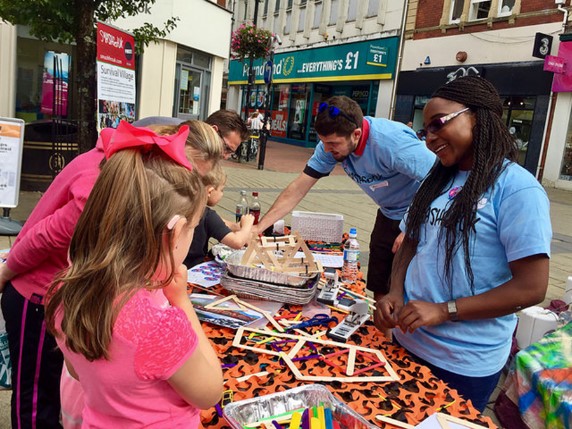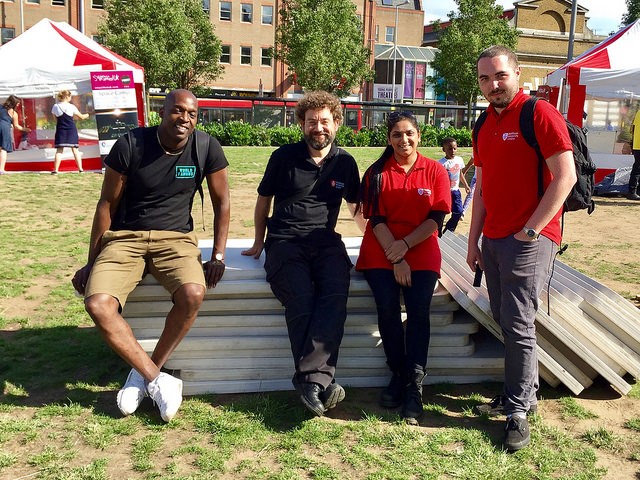Objectives
- To deliver a Survival Village and Space Camp (SVSC) of one day built at each of four locations, Greenwich (July), Brighton (the BSA Science Festival) (September), Manchester Science Festival (October) and Birmingham (November).
- To take SVSC to four areas in each of the new locations which are currently under-served by current informal engineering outreach or learning activities nearby
- To carry out related SVSC schools outreach programme in each of the four locations (Greenwich, Brighton, Manchester and Birmingham). This will involve going into a minimum of three schools and carrying out engineering workshops which will relate to the school curriculum.
- To engage 12 working engineers from academia and commerce in the development and delivery of the Survival Village as advisers and participants.
- To provide training and outreach support to 12 engineers to better enable them to carry future public engagement projects of their own.
- To build a SVSC community of engineers, audience participants and public engagement specialists to create a sustainable methodology for continuing to roll out SVSC in other areas of the UK.
Background
The spark that led to the development of SMASHfestUK was a mini-science, music, comedy and art festival for Dr Lindsay Keith’s fortieth birthday, created in a local pub by her partner Wyn and friends. The mix of entertainment and activities was a big success for all ages attending.
This inspired Lindsay and Wyn to ask “Why can’t everyone have access to this kind of event?” and to link the idea with their own academic research and practice in social inclusion and participatory design. Reports, such as the ASPIRES and the Warwick Commission, identified the lack of underserved and underrepresented groups progressing in STEM and Arts subjects. From this they started developing ideas for a festival and informal education programme designed specifically for, and more importantly, with, disadvantaged communities, starting with Deptford, South London.
Audience
SMASHfestUK targets young people and their families, working with local community groups and young people themselves to design the festival. They ensure that it is primarily youth and entertainment led, but has many STEM activities – a ‘science by stealth’ approach. The team work with the youth groups to make sure the festival appeals to parents just as much as young audiences, creating intergenerational learning experiences. The outreach program linked to the project was successful in reaching areas often not reached by informal engineering activities. With 50% of engineers involved being female and over 60% of BAME backgrounds, SMASHfestUK fostered engagements between audiences and role models that truly represented a diverse engineering field. These audiences came from communities in highly diverse and deprived areas of Greater London, South Wales, Bradford and Gloucestershire. Overall, SMASHfestUK engaged over ten thousand young people, teachers and volunteers from disadvantaged and underrepresented backgrounds.


The Project
In the period from March to November 2017, SMASHfestUK travelled around the UK bringing their festivals to different under-represented communities, under the title of the ‘Earth and Sky Tour’. Never short of an apocalyptic idea, the 2016 festival included a solar storm hitting Deptford, plunging the world into darkness as hospitals crumble and water supplies dry up. This year, the festival adds “destroyed by a supervolcano” to a long list of world disaster scenarios from previous years that included a solar storm and an asteroid hitting the earth. The ominous themes allow groups from all areas and backgrounds to engage in the topic, relate the range of experiences and activities to their lives, and the SMASHfestUK team work with local people to ensure that they adapted the storyline to resonate with local groups. Participants help to rebuild the world after the natural disaster, with a series of activities that use engineering to solve problems, embedding a sense of empowerment and optimism.
The festival involved 27 engineers developing activities and introducing public audiences to aspects of engineering in a creative way. This cohort of diverse engineers was key to engage and inspire under-represented communities and attracted over 10,200 visitors.
The engineering challenges included building structures using scrap material such as scaffolding, thinking about safe water supplies and building water filters, building piping and heating systems, and making rocket stoves from bricks. A core team of engineers and scientists from universities and industry supported the activities, as well as volunteers from the community. The Women’s Engineering Society also sent volunteers, and SMASHfestUK ensures that its engineers represent a diverse range of ethnicities, genders and socioeconomic backgrounds, so that young people can meet engineers like them. The events also attracted over 200,000 online engagements, including 60,000 online live feed views as the SMASHFestUK team attempted to break a world record attempt at exploding the largest cryo-volcano ever created!
One of the most popular activities is making ID cards. When arriving at the festival visitors talked to the team about their career aspirations with the team making them aware of the plethora of choices for STEM related careers, before creating their own professional card including their name, future job and photo. Visitors were then directed to specific areas of the festival that related to their interests. Along with the ID cards they were given a variety of resources to take home to encourage them to continue to think about STEM careers outside of the festival.
Impact summary
SMASHfestUK ‘Earth and Sky Tour’ 2017 had over 10,000 visitors and 62% of attendees said they were interested in STEM careers after attending the festival. The project also worked with 41 apprentice engineers from Transport for London and 30 Young Explainers, who were recruited from local schools, colleges and youth groups. These young people were trained in public engagement and safeguarding and then put those skills into practice by supporting participating academics, industry outreach workers, artists and performers in delivering high-quality public engagement.
Learning
One of the key successes was an event held at the heart of the communities that this project aimed to engage. The teams understanding of the needs and challenges to access of those communities allowed them to tailor each event to the targetted group. Taking the time to develop meaningful relationships with hosting partners and local groups enabled SMASHfestUK to be seen as part of the community, not a stranger. The expertise they matured in partnership development was seen on the individual interactions with visitors. Engineers, general volunteers and contributors were there to spark discussions around engineering, creating numerous opportunities for meaningful engagements.
More information can be found on the SMASHfestUK website.
